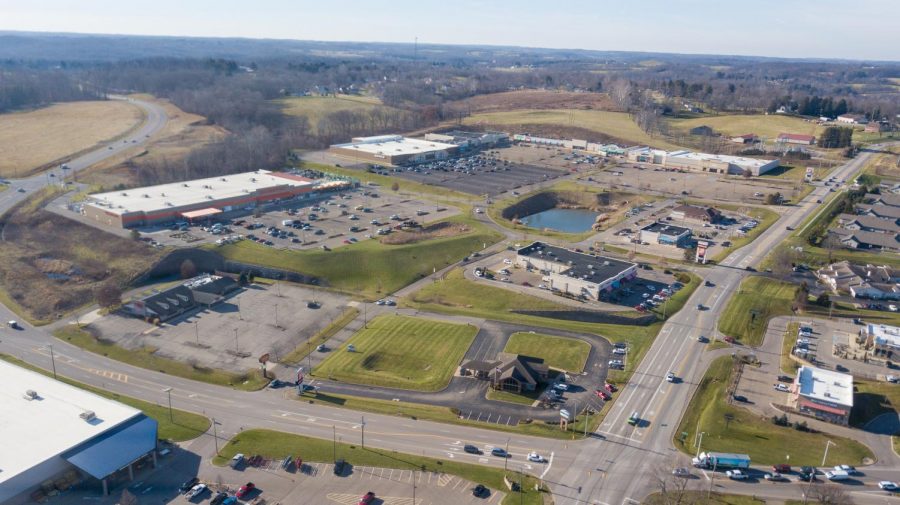Northpointe Center sold for $6.5 million
December 14, 2021
As Americans pivot to more online e-commerce and next-day delivery options one local shopping center is facing a dire economic situation.
Having lost its anchor tenant, Hobby Lobby, an American arts and crafts retailer earlier this year, the Northpointe Center, located along Maple Avenue at the north end of the city, was recently sold after being placed into receivership.
Meanwhile, restrictive deed documents organized during the development of the complex in the early 2000s make the ability to attract new commercial clients even tougher in the current economic climate which has upended retail demand.
As previously reported by Y-City News, the loss of the retail giant placed the Northpointe Center in an alarming financial position.
Having already witnessed multiple other tenants leave, the relocation meant that even fewer people would regularly visit the shopping center.
In March, we discovered a document online from 2018 that made it possible to calculate each of the storefront’s corresponding square footage.
Using that resource, we were able to calculate what the center’s occupancy rate would be after Hobby Lobby left, a concerning 34 percent.
Note: The Kohl’s, the Home Depot and Pizza Cottage locations are not owned by the Zaremba Group, the entity which up until late September owned the property, and thus was not included in the calculation.
The anchor tenant represented nearly 30 percent of the total rentable square footage and left not only a large financial shortfall but less spillover traffic which often benefits other smaller retailers.
The departure also left another concerning possibility, in many lease contracts, which consist of tens of thousands of dollars in monthly rent payments, if not hundreds of thousands, should an anchor tenant leave, contracts often can be renegotiated or trigger dormant lease clauses in the rental contract.
Y-City News was unable to validate if such clauses had been triggered or if they were present in rental contracts at the Northpointe Center.
According to Matthew Schley, Zanesville’s Community Development Director, there is no indication that the new owners plan to demolish any of the structures, as has happened in bigger cities such as Columbus due to the current price of land.
Documents from the Muskingum County Auditor’s Office show that on September 23 the property was transferred via a Sheriff Deed from the Zaremba Group to a Washington, DC firm called CWCapital for a price of $6,533,334 which included seven parcels.
Schley referred to the transfer as a receivership that was initiated due to financial restraints. That process is commonly used to assist creditors recover funds in default and can also help avoid a bankruptcy.
A request for comment was not returned by either company, but Schley said a representative of the new owners had met with him and they want to revitalize the property.
Adding complexity to the situation, deed restrictions put in place when the site was constructed in the early 2000s prohibits many tenants such as those who sell alcohol or provide medical services.
As The New York Times reported last summer, shopping centers and malls were already headed towards financial collapse in the years following the Great Recession.
When the pandemic struck the United States in March 2020, it is believed to have become the final catalyst that many experts say has sent those properties into an unrecoverable downward death spiral.
Online shopping and the advent of many retailers offering next-day delivery, the need or want for many to go to a physical store has declined, according to research.
Like many large financial purchases, such as buying a home, where the mortgage, which is issued by a local bank, is later sold up the financial stream and packaged into securities, so are many individual commercial properties.
Traditional, due to their size, complexity and need for asset valuation by its firm’s financial backing bank, property holders were unable to lower rents even if it meant a growing number of empty retail spaces.
For a property owner, valuations often come in large part based upon set rental rates, even if those rates leave a property partially vacant for years if not decades.
This details the odd phenomenon where a property owner would rather not renew a commercial lease at the same rate and instead drastically increase the monthly payment forcing the tenant to leave and the property to sit dormant.
With increased valuations, owners are able to refinance and have access to additional capital for new investments or projects, even if the underlying asset hasn’t truly, in the traditional sense, increased in value.
As for the Northpointe Center, it remains unclear what is to come in the following months and years. The occupancy rate still hovers around 30 percent, which many analysts say places the property in a concerning fiscal situation.
It appears taxes still continue to be paid, though the 30-year TIF, a means to redistribute where property tax dollars go, still remains in place.















